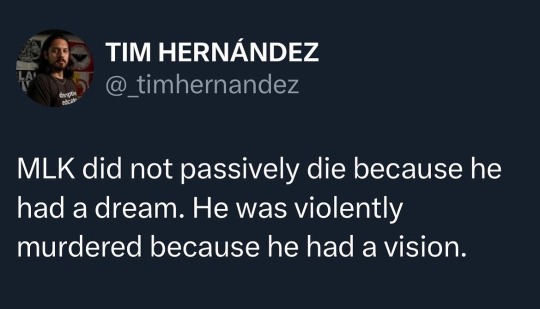#mlk jr day
Text

By: Ron Kapeas
Published: Jan 8, 2024
JTA — In a speech marking Martin Luther King Jr. Day weekend, Rep. Ritchie Torres likened protesters who have celebrated Hamas’s October 7 massacres to white people in the Jim Crow era who celebrated after the lynching of Black people.
“I was profoundly shaken not only by October 7, but by the aftermath,” Torres, a Black Bronx Democrat, said Friday in a speech at Central Synagogue, a prominent Reform congregation in midtown Manhattan. “I found it utterly horrifying. To see fellow Americans openly cheering and celebrating the deadliest massacre of Jews since the Holocaust. And for me, the aftermath of October 7 revealed a barbarity of the American heart that reminded me of an earlier and darker time in our nation’s history, a time when the public mobs of Jim Crow would openly celebrate the lynching of African Americans.”
Protests have proliferated since October 7, when Hamas terrorists murdered some 1,200 people, kidnapped around 240 and brutalized thousands more in an invasion from Gaza. They have grown as Israel has waged a war in Gaza to eliminate the terror group, and especially as casualties mounted: So far, close to 25,000 Palestinians have been killed, according to the Hamas-run Gaza health ministry, which does not differentiate between fighters and non-combatants and is also believed to tally civilians killed by errant rockets fired by terror groups.
A number of the protests have decried the October 7 violence on Israelis, but others have skated over the initial massacres or have embraced Hamas and described its atrocities as resistance.
Torres, a member of the progressive caucus in Congress, has garnered a reputation as an unstinting supporter of Israel. He has duked it out online with fellow progressives in debates over Israel, a dynamic that has only intensified since October 7. Torres is heavily funded by AIPAC and donors aligned with the pro-Israel lobby, and spoke at a massive rally for Israel in Washington on November 14.
In his speech, Torres alluded to the controversies that assailed elite universities after the presidents of Harvard, the Massachusetts Institute of Technology and the University of Pennsylvania told Congress that calls to commit genocide against Jews did not necessarily violate the schools’ codes of conduct. The ensuing uproar drove Harvard’s and Penn’s presidents to resign.
“What we’ve seen in the aftermath of October 7, is appalling silence and indifference and cowardice from so called leaders in our society from institutions that we once respected and admired,” he said. “And if we as a society cannot bring ourselves to condemn the murder of innocents with moral clarity, then we must ask, what are we becoming as a society? What does that reveal about the depths of antisemitism in the American soul?”
I had the honor of delivering the annual MLK sermon at Central Synagogue.
My speech touches on a range of topics and themes: October 7th, Jim Crow, Leo Frank, MLK, Elie Wiesel, silence, indifference, moral clarity, nonviolence, Israel, Am Yisrael Chai, Hatikvah, and hope. pic.twitter.com/stxqxzgyLi
— Ritchie Torres (@RitchieTorres) January 16, 2024
Central is a locus for some of the city’s wealthiest liberal Jewish families, many of whom are also firm supporters of Israel. Dr. Shonni Silverberg, the synagogue president, introduced Torres as a champion of progressive priorities as well as an advocate for Israel, and noted that he is the first openly LGBTQ representative elected from the Bronx.
“Ritchie remains steadfastly focused on the priorities of his South Bronx constituents, expanding access to safe and affordable housing, rebuilding New York economically and ensuring that no child goes hungry and that all receive a good education,” she said. “But he has also shown himself both in and out of Congress to be a great friend of the American Jewish community and Israel.”
--
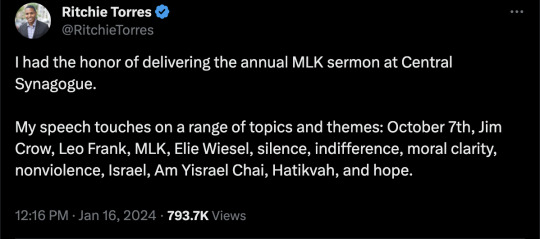
==
I was shocked, but not surprised. Shocked at how openly, how loudly and how quickly pro-Hamas, pro-terrorism supporters emerged from their Postcolonial Studies, Gender Studies, Intersectional Feminism Studies and other fraudulent sewers in the ivory towers long before Israel ever fired a shot back.
I was not surprised, however, since antisemitism is a cornerstone of Intersectionality, as I posted about more than two years ago:
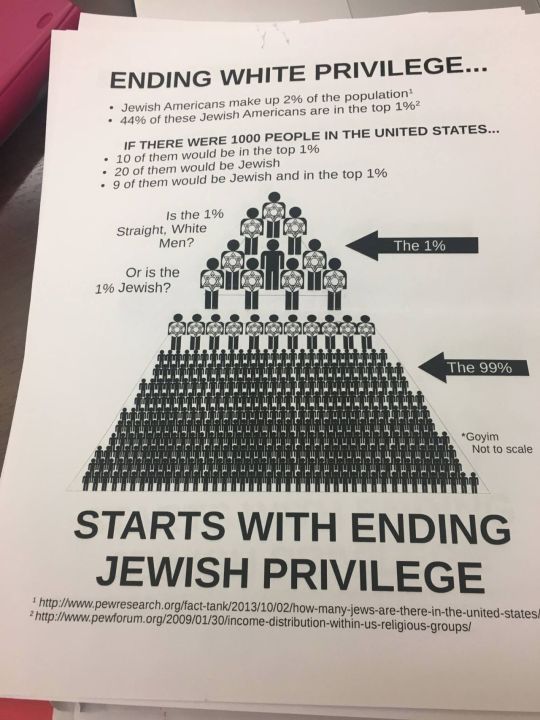
I naïvely expected that they'd go, "whoa, we didn't mean it like that, that's not what we were after," the standard No True Scotman tactic to distance their enlightened antisemitism from the antisemitism of murderous Islamic jihadists.
But they went the other way and leaned into it, cheering it on, while others tried to gaslight everyone with the usual array of denials that they weren't saying what they were openly saying, and that anyway, if they were saying it, that's not what they meant.
#Ritchie Torres#MLK Jr Day#MLK Day#Martin Luther King#Martin Luther King Day#Martin Luther King Jr Day#islamic terrorism#hamas#hamas supporters#pro hamas#pro palestine#pro palestine is pro hamas#antisemitism#October 7#Oct 7#hamas massacre#october 7 massacre#exterminate Hamas#religion is a mental illness
21 notes
·
View notes
Text
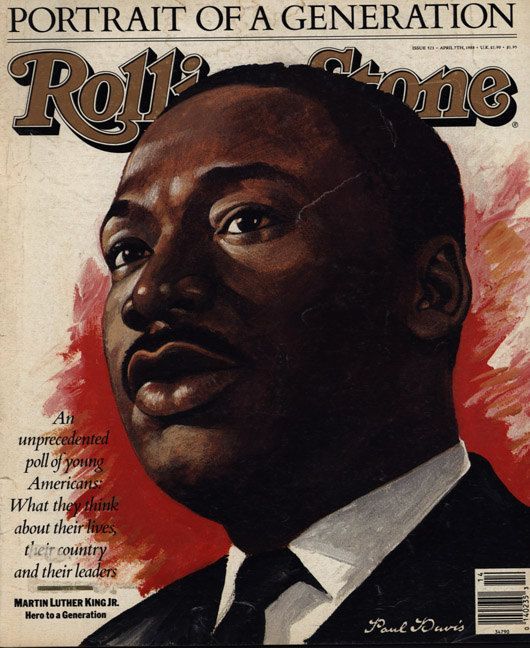
38 notes
·
View notes
Text
instagram
bet
Today, we celebrate Dr. King and the legacy of the woman who stood beside him to execute the vision. Coretta Scott King was an entire movement in her own right, so let’s clear the lens so we can put the optics in focus. She was an activist, A valedictorian, a singer, and a musician—a multi-hyphenate before the term existed.
We celebrate today because of Coretta - as she carried the torch to legislature where a federal holiday was made in MLK’s honor in 1983.
We won’t tolerate the erasure of Black Women who fought on the front line for your newfound mischaracterization of history for a byline. Read that again. (You hear me Johnathan majors?!? A real man would let the woman he loves be herself in the best way and loves her just the way she is. She doesn’t have to live to your impossible standards and high expectations and this includes being your corretta)
Let’s give credit and props to the legacy of Coretta Scott King. We are thankful for you. 🌸✨
#Instagram#MLK#mlk jr#mlk day#mlk jr day#mlk quotes#martin luther king jr#heartbreaking 💔#black lives matter#important#tw: discrimination#true crime#topic: discrimination#tw: oppression#youtube#topic: oppression#blm#blue lives don't matter#blue lives dont exist#black lives movement#black lives have always mattered#black lives are important#black lives fucking matter#blue lives matter#stop police brutality#blue lives murder#police brutality#defund the cops#defund 12#defund police
4 notes
·
View notes
Text

Posted it to my story on Instagram but I just want to bring this MLK speech back, as some have a tendency to misappropriate his words for their shitty talking points. He lays it all out and more here.
#mlk#mlk day#mlk jr#mlk jr day#martin luther king jr#free palestine#palestine#gaza#free gaza#u.s.a.#israel#war on gaza#end genocide
4 notes
·
View notes
Text
Hello. Happy MLK Jr. Day. Can you do this Black poet a favor and drop a like or a kind word? thaaaanks unfortch i have to get my engagement up to thrive on social media when i drop my book
🎥: kristian kettner
🔊: midimagician
[Video ID: A bouquet of roses burns in the background. The text on the video reads, “On the third Monday of January / every year for the last forty years, / the government tasks us with / commemorating the life & work / of someone it killed. / America is a bait & switch / to its Black citizens; / a joke republic / that has been known / to love bomb— / first flies the bullet, / then it humors us with a holiday / as a favor, a set of hours considered / appropriate to grieve & we / are expected to fit / our ungrateful obsidian rage / into one day, and the next / thing you know, the sun rises / heavy & red on a bent brown neck / like clockwork, / we are demanded / to snap back into / this noose of a nation. End ID]
#poetry#writeblr#mlk#mlk jr#mlk jr day#martin luther king jr#black tumblr#black poets#black poetry#poets of color#writers of color#black writers#authors of color
11 notes
·
View notes
Photo
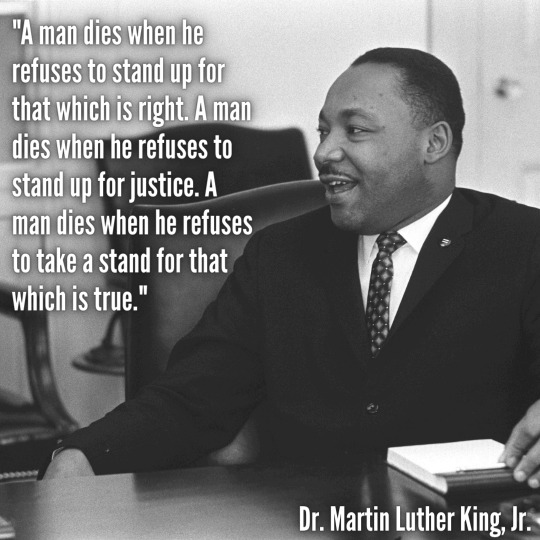
On Martin Luther King Jr. Day, find out from the nonprofit organization Teach For America how you can honor and celebrate the civil rights leader’s life & legacy.
➡️ http://bit.ly/3CLhMjT
#martin luther king day#mlk day#happy mlk day#martin luther king jr day#mlk jr day#mlk day of service#mlk weekend#martin luther king#mlk#martin luther king jr#mlk jr#dr martin luther king jr#dr king#martin luther king quotes#mlk quotes#civil rights#civil rights movement#social justice
15 notes
·
View notes
Text





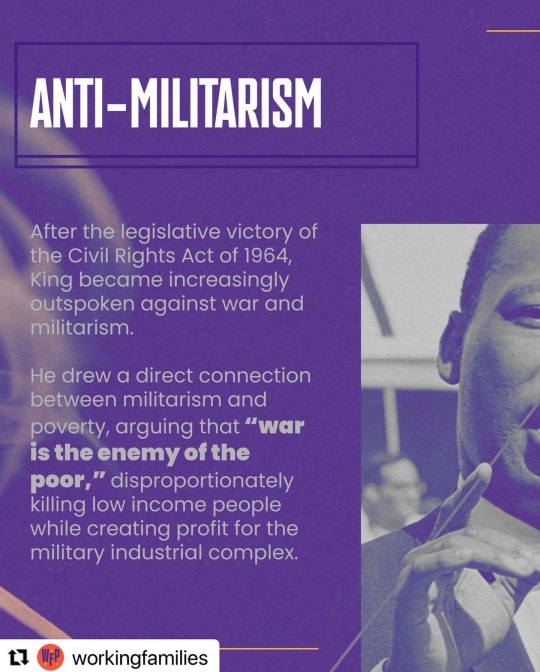

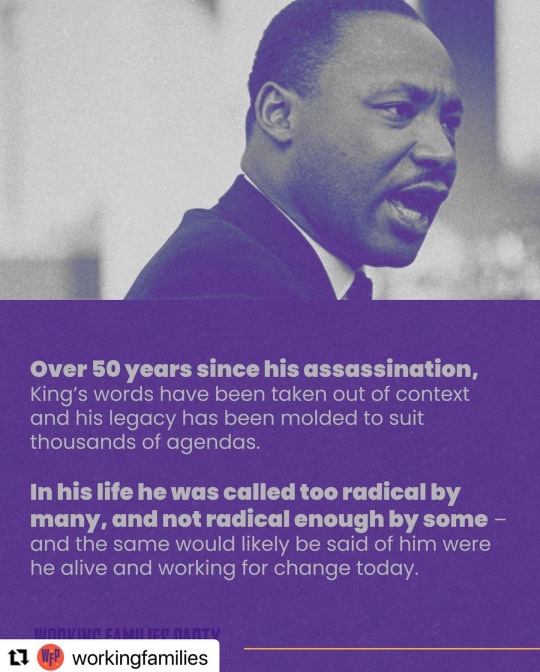

“The fact is that capitalism was built on the exploitation and suffering of black slaves and continues to thrive on the exploitation of the poor - both black and white, both here and abroad.” - MLK Jr, “The Three Evils of Society,” 1967
#Repost @workingfamilies with @use.repost ・・・
Every year on #mlkday, organizations and politicians use Martin Luther King Jr.'s symbol to support their own ideologies and agendas — but what did Martin Luther King Jr ACTUALLY say and do? #mlk
#martin luther king jr#martin luther king day#mlk jr#MLK jr day#racial justice#civil rights movement#civil rights#racism#capitalism#anticapitalist#antiwar#antimilitarism#anti militarism#working families party#black resistance#black liberation#black lives matter#human rights#structural violence#structural racism#social justice#racial oppression#american history#America
8 notes
·
View notes
Text
MLK Jr. Day (2023)

January 16th is MLK Jr. day. Although he's mostly known for his no violence approach and the "I have a dream" speech, I want to show the truth of the black struggle for equality with some quote by him.
My favorite one is:
One has a moral responsibility to disobey unjust laws
Other good quotes are
Capitalism was built on the exploitation of black slaves and continues to thrive on the exploitation of the poor.
Capitalism has outlived its usefulness. It takes the neessities from the masses to give luxuries to the classes.
The problems of racial injustice and economic injustice cannot be solved without a radical redistribution of political and economic power.
I want to take this opportunity to show how capitalism works, not just in the USA, but around the world. When Lincoln abolished slavery in the 19th century, forced labor continued to happen. How? Black people had no land or any property. They had to survive by working for someone. Both racism and the market logic of supply and demand made their labor extremely cheap and exploitative. Slavery also continued to exist in prisons, and new laws were made to target black people who struggled to find a master, such as the vagrancy laws — a good example on why the police doesn't exist to protect you, but to control you.
In the 50s and 60s, with the civil rights movements, black and poor people gained access to education, which was segregated at the time. But what happened after that? Tuition fees for universities skyrocketed. That's no coincidence.
No matter how many feel-good articles news outlets write or how many anti-racist cop movies they make, we must not forget capitalism thrives on inequality.
FurAffinity
DeviantArt
imgur
8 notes
·
View notes
Text
Spokane Unites for Annual MLK Rally Despite Frigid Temps
“The wide diversity in attendees showed the lasting legacy of MLK, who is officially observed on Jan. 15 in the city of Spokane.”
0 notes
Text
I made the best of today: MLK Jr. Day.
I wanted to write a post about all those he inspired and his shortcomings. I ended up having a migraine and a sudden drop in energy… needed to rest.
—
Like did you know that Dr. Ambedkar in South Asia was similar to him in the sense of tackling discrimination?
Caste and race discrimination is well and alive there, and it affects millions upon millions of people.
And as I was telling my white friend the other day, in the US over here, racism and discrimination affects us all - including white people! Including people with privilege!!
Just because they have the privilege to not think about it (because systemic discrimination favors them) doesn’t mean that they have to be willfully ignorant.
Anti-racism, anti-casteism, anti-discrimination… ARE ACTIVE PURSUITS, NOT PASSIVE.
It is not enough (and harmful) to say you’re not racist and you “don’t see color.”
We must all keep fighting for equity by being who we are and tackling down walls of oppression where we see it. It doesn’t have to be as big as MLK Jr. or Dr. Ambedkar. Or Malcolm X.
You don’t have to be a complete revolutionary or a religious leader.
You can just be a person advocating for your fellow man. Advocacy goes both ways: supporting those who have less privilege and helping those who indiscriminately use their privilege to step over others UNDERSTAND why this is not sustainable.
After all, this blog? Me talking about my abuse and understanding toxic behaviors (including my own)… seeks to do that.
We are all human and we are all worthy - “the work” is to help people truly see that, including the perpetrators of harm.
#mlk jr#MLK jr day#healing#journal#love#self love#relational love#anti racism#anti casteism#Asian American perspective#ambedkar
1 note
·
View note
Text
Happy Martin Luther King jr day everyone!! I want you all to remember you matter, even if you think you don’t! Let’s keep making the world a better place!
1 note
·
View note
Text

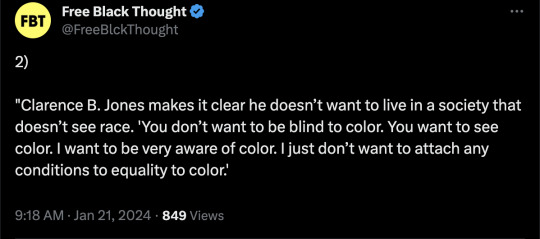
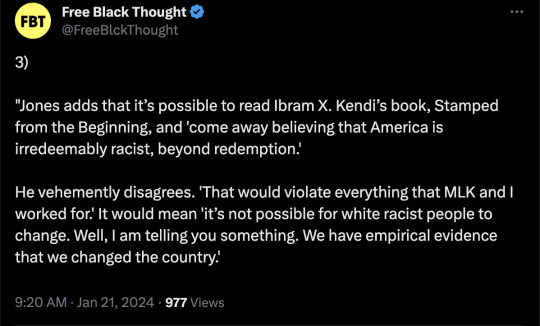
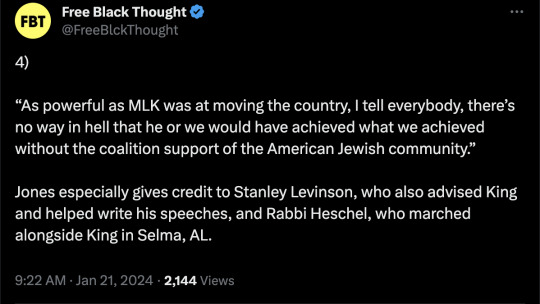


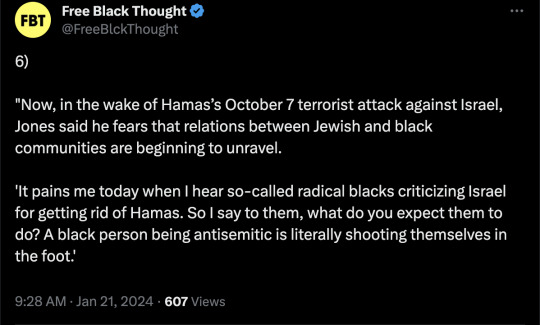
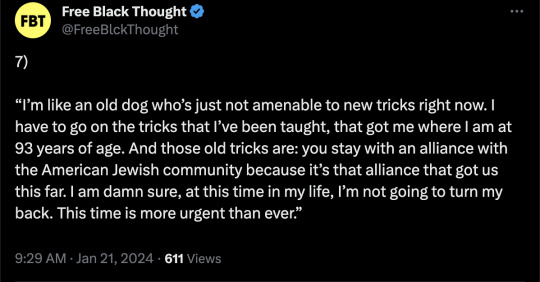
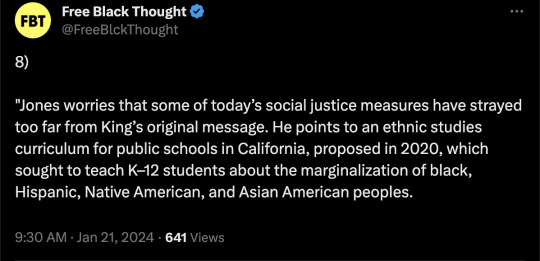

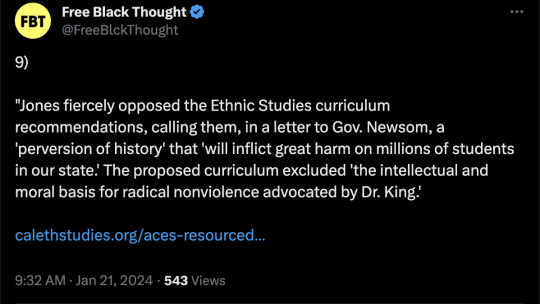
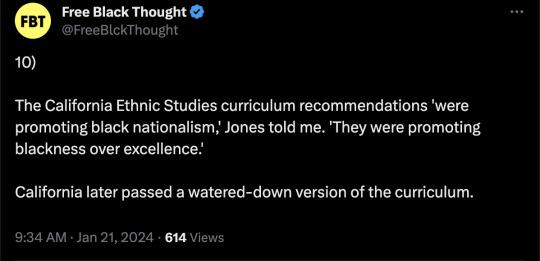

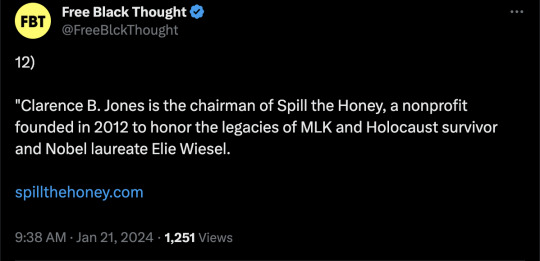
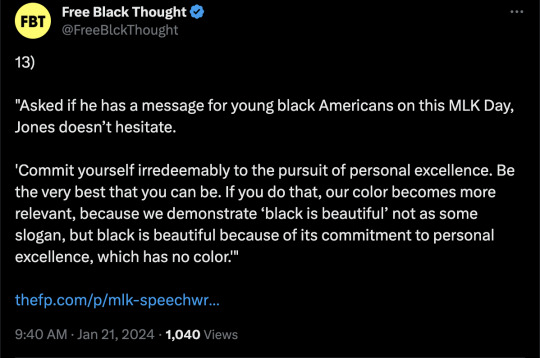
By: Francesca Block
Published: Jan 15, 2024
In the 1960s, when Clarence Jones was writing speeches for Martin Luther King Jr., he used to joke with the civil rights leader: “You don’t deserve me, man.”
“Why?” King would ask.
“I hear your voice in my head. I hear your voice in perfect pitch,” Jones would respond. “So when I write, I can write words that accurately reflect the way you actually speak.”
King would agree. “Man, you are scary. It’s like you’re right in my head.”
And Jones is still, in his mind, having conversations with his friend, who was assassinated at the age of 39 on a Memphis hotel balcony in 1968. Especially now, as America’s racial climate seems to have worsened, despite the fact that King successfully fought to ensure all Americans are given equal protection under the law, regardless of their skin color. A poll from 2021 shows that 57 percent of U.S. adults view the relations between black and white Americans to be “somewhat” or “very” bad—compared to just 35 percent who felt that way a decade ago.
Jones knows exactly what King would have felt about that. He says it out loud, and directs it to his late mentor: “Martin, I’m pissed off at you. I’m angry at you. We should have been more protective of you. We need you. You wouldn’t permit what’s going on if you were here.
“We are trying to save the soul of America.”
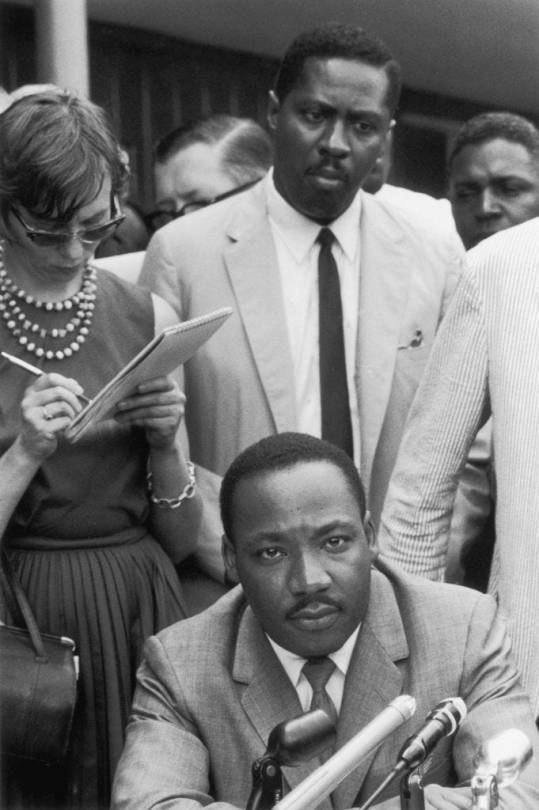
[ Jones, behind Martin Luther King Jr. in 1963, wrote: “I saw history unfold in a way no one else could have. Behind the scenes.” ]
I spoke to Jones, 93, two weeks ago as he sat on a beige couch in the humble second-floor apartment in Palo Alto, California, that he shares with his wife. A black-and-white close-up of King sits directly above his head, almost like a north star.
“Regrettably, some very important parts of his message are not being remembered,” Jones said, referring to King’s belief in “radical nonviolence” and his eagerness to build allies across ethnic lines.
“Put in a more negative way,” he added, King’s messages “have been forgotten.”
Jones was a young, up-and-coming entertainment lawyer when he first met King in February 1960. The preacher had turned up on the doorstep of his California home and tried to convince him to move to Alabama to defend him from a tax evasion case. But Jones wasn’t interested.
“Just because some preacher got his hand caught in the cookie jar stealing, that ain’t my problem,” he said in a talk, years later.
But King wasn’t one to give up easily. He invited Jones to attend his sermon at a nearby Baptist church in a well-to-do black neighborhood of Los Angeles. Standing at the pulpit, King spoke to a congregation of over a thousand people, delivering a message that seemed almost tailor-made for Jones.
Jones remembers King talking about how black professionals needed to help their less fortunate “brothers and sisters” in the struggle for equality. He realized, then and there, what an incredible speaker King was, and felt compelled to join his cause.
“Martin Luther King Jr. was the baddest dude I knew in my lifetime,” Jones says.
Jones moved down to Alabama to join King’s legal team. He helped free King of any charges in Alabama, and quickly became one of the leader’s closest confidants, and ultimately, his key speechwriter.
Jones refers to himself and King as “the odd couple,” because, he says, “we were so different.” King was the son of a preacher from a middle-class family in the South. Jones grew up the son of servants, raised by Catholic nuns in foster care in Philadelphia, who he credits with instilling in him “a foundation of self-confidence that was like a piece of steel in my spine.”
He said this confidence propelled him to graduate as the valedictorian from his mixed-race high school just across the border in New Jersey, and then on to Columbia University, where he earned his bachelor’s degree in 1953. After a brief stint in the army, where he was discharged for refusing to sign a pledge stating that he was not a member of the Communist Party, Jones enrolled at the Boston University School of Law, graduating in 1959.
Though Jones was mainly a background figure in the 1960s civil rights movement, it might not have been possible without him. He fundraised for King’s Southern Christian Leadership Conference so successfully that Vanity Fair later called him “the moneyman of the movement.” In 1963, when King was in prison, Jones helped smuggle out his notes, stuffing the words King scrawled on old newspapers and toilet paper into his pants and walking out.
Later, he helped string those notes together into King’s famous address, “Letter from Birmingham Jail,” which argued the case for civil disobedience, and was eventually published in every major newspaper in the country.
Jones then wooed enough deep-pocketed donors, including New York’s then-governor Nelson Rockefeller, to raise the bail needed to release King and many other young protesters from jail.
Jones also helped write many of King’s most iconic speeches—“not because Dr. King wasn’t capable of doing it,” Jones emphasized—“but he didn’t have the time.” Jones crafted the opening lines of King’s “I Have a Dream” speech from his D.C. hotel room on the eve of the 1963 March on Washington. In his book, Behind the Dream, he recounts how he penned their shared vision for a better nation onto sheets of yellow, lined, legal notepaper, many of which ended up crumpled on the floor.
But he didn’t write the most famous words: “I Have a Dream”—that was all King, his book notes. “I would deliver four strong walls and he would use his God-given abilities to furnish the place so it felt like home,” Jones writes about their speech-writing dynamic.
The day after he wrote that speech, Jones stood just fifty feet behind King as he delivered it to the hundreds of thousands gathered on the steps of the Lincoln Memorial. “I saw history unfold in a way no one else could have,” Jones writes. “Behind the scenes.”
The movement King led with Jones by his side helped achieve school integration, the Civil Rights Act of 1964, and the Voting Rights Act of 1965.
So, when asked if America has made any progress on race, Jones is dumbstruck. “Are you kidding?” he said, with shock in his voice. “Any person who says that to the contrary, any black person who alleges themselves to be a scholar, or any white person who says otherwise, they’re just not telling you the truth.
“Bring back some black person who was alive in 1863, and bring them back today,” he adds. “Have them be a witness.”
But after the death of George Floyd in 2020, 44 percent of black Americans polled said “equality for black people in the U.S. is a little or not at all likely.” And “color blindness”—the once aspirational idea of judging people by their character rather than their skin color, which King famously espoused—has fallen out of fashion. The dominant voices of today’s black rights movement argue that people should be treated differently because of their skin color, to make up for the harms of the past. One of America’s most prominent black thinkers, Ibram X. Kendi, argues that past discrimination can only be remedied by present discrimination.
Jones makes it clear he doesn’t want to live in a society that doesn’t see race. “You don’t want to be blind to color. You want to see color. I want to be very aware of color.”
But, he emphasizes: “I just don’t want to attach any conditions to equality to color.”
He adds that it’s possible to read Kendi’s prize-winning book, Stamped from the Beginning, and “come away believing that America is irredeemably racist, beyond redemption.”
It’s a theory he vehemently disagrees with. “That would violate everything that Martin King and I worked for,” he said. It would mean “it’s not possible for white racist people to change.”
“Well, I am telling you something,” Jones adds. “We have empirical evidence that we changed the country.”
Jones is the first to admit King and his circle didn’t change the country on their own.
“As powerful as he was at moving the country, I tell everybody, there’s no way in hell that he or we would have achieved what we achieved without the coalition support of the American Jewish community.”
Jones especially gives credit to Stanley Levinson, who also advised King and helped write his speeches, and Rabbi Abraham Joshua Heschel, who marched alongside King in Selma, Alabama. He remembers being on the picket lines and talking to Jewish protesters who told him about their own families’ experiences in the Holocaust.
“There would have been no Civil Rights Act of 1964, no Voting Rights Act of 1965, had it not been for the coalition of blacks and Jews that made it happen,” Jones says.
Now, in the wake of Hamas’s October 7 terrorist attack against Israel, Jones said he fears that relations between the Jewish and the black communities in America are beginning to unravel.
He said he has seen how, days after the attack, college students—many of them black—marched on campus, chanting for the death of Israel.
“It pains me today when I hear so-called radical blacks criticizing Israel for getting rid of Hamas. So I say to them, what do you expect them to do?”
He continues: “A black person being antisemitic is literally shooting themselves in the foot.”
Long before October 7, Jones has proudly shown his allegiance to the Jewish people: a gold mezuzah—the small decorative case, which Jews fix to their door frames to bless their homes—is nailed outside his Palo Alto apartment.
“I’m like an old dog who’s just not amenable to new tricks right now,” Jones says. “I have to go on the tricks that I’ve been taught, that got me where I am at 93 years of age. And those old tricks are: you stay with an alliance with the American Jewish community because it’s that alliance that got us this far.
“I am damn sure, at this time in my life, I’m not going to turn my back. This time is more urgent than ever.”
Meanwhile, Jones worries that some of today’s social justice measures have strayed too far from King’s original message. He points to an ethnic studies curriculum for public schools in California, proposed in 2020, which sought to teach K–12 students about the marginalization of black, Hispanic, Native American, and Asian American peoples.
Jones fiercely opposed the new curriculum recommendations, calling them, in a letter to Governor Gavin Newsom, a “perversion of history” that “will inflict great harm on millions of students in our state.” He wrote that the proposed curriculum excluded “the intellectual and moral basis for radical nonviolence advocated by Dr. King” and his colleagues.
“They were promoting black nationalism,” he told me. “They were promoting blackness over excellence.”
California later passed a watered-down version of the curriculum.
At the same time, Jones feels more conflicted about affirmative action, a policy he believes was grounded in “the most genuine, the most beautiful, the most thoughtful” intentions, and that it helped to “accelerate the timetable. . . to truly give black people equal access.”
Even so, he is pragmatic about the Supreme Court’s decision to strike it down last year. “You had to stop the escalator somewhere.”

[ Jones is still working. He released his autobiography, The Last of the Lions, in August, and is now recording the audiobook. ]
In the immediate years after King’s death in 1968, Jones struggled to find a path forward. He was angry and even considered “taking up arms against the government,” which he blamed for allowing King’s death to happen.
For a while, Jones dabbled in politics—serving as a New York State delegate at the 1968 Democratic Convention—and then in media, purchasing a part of the influential black paper New York Amsterdam News. In 1971, he acted as a negotiator on behalf of some of the inmates behind the Attica prison uprising, unsuccessfully trying to seek a peaceful resolution.
But King’s voice—always in his head—eventually steered him back toward his original purpose.
A father of five, Jones lives with his wife, Lin, just a five-minute walk from the Stanford campus where he maintains an affiliation with the Martin Luther King, Jr. Research and Education Institute. In 2018, Jones co-founded the University of San Francisco’s Institute for Nonviolence and Social Justice to teach the lessons of King and Mahatma Gandhi “in response to the moral emergencies of the twenty-first century.”
He is also the chairman of Spill the Honey, a nonprofit founded in 2012 to honor the legacies of King and Holocaust survivor and Nobel laureate Elie Wiesel. And in August 2023, he released his autobiography, The Last of the Lions, so named because he is possibly the only member of King’s civil rights circle still alive. “There’s an African saying that I often reflect upon when I think about his legacy and my own part in his movement,” Jones writes in his book. “If the surviving lions don’t tell their stories, the hunters will take all the credit.”
Although the eight years he spent with King happened more than half a century ago, Jones told me he now sees his mission as clearly as ever. Asked if he has a message for young black Americans on this Martin Luther King Jr. Day, he doesn’t hesitate.
“Commit yourself irredeemably to the pursuit of personal excellence,” he says emphatically. “Be the very best that you can be. If you do that. . . our color becomes more relevant, because we demonstrate ‘black is beautiful’ not as some slogan, but black is beautiful because of its commitment to personal excellence, which has no color.”
==
What's going on now is what happens when activists and fanatics, such as frauds like Kendi and Nikole Hannah-Jones, construct history curriculum, not actual historians. If they teach the Jewish allyship with the Civil Rights Movements at all, it will be wrapped in conspiracy theory such as "interest convergence."
https://newdiscourses.com/tftw-conspiracy-theory/
This doctrine insists that white people (as the racially privileged group) only take action to expand opportunities for people of color, especially blacks (see also, BIPOC), when it is in their own self-interest to do so, and in which case the result is usually the further entrenchment of racism that is harder to detect and fight. Under interest convergence, every action taken that might ameliorate or lessen racism (see also, antiracism) not only maintains racism, but does so because it was organized in the interests of white people who sought to maintain their power, privilege, and advantage through the intervention.
One of the truly gross and despicable things about frauds like Kendi is that while he pulls every bogus fallacy to assert that nothing has changed - it's a tenet of Critical Race Theory that nothing has changed, racism has only gotten better at hiding itself and becoming more entrenched - his own success blows this conspiracy theory completely out of the water, given how fawning his acolytes are about his wildly overstated wisdom, and the number of white fans he's accumulated who masochistically want to be told how racist they are and how much they hurt black folk every single day.
That's not possible unless racism is both aberrant and socially and culturally unacceptable.
#Clarence B. Jones#Clarence Jones#MLK Day#MLK Jr Day#Martin Luther King Jr#Martin Luther King#Martin Luther King Day#i have a dream#Henry Rogers#Ibram X. Kendi#black nationalism#colorblindness#color blindness#colorblind#color blind#antiracism#antiracism as religion#antisemitism#am yisrael chai#pro palestine#pro hamas#islamic terrorism#israel#palestine#hamas terrorism#hamas war crimes#exterminate hamas#religion is a mental illness
9 notes
·
View notes
Text
there's a great clip on youtube of sesame street celebrating Martin Luther King, Jr. Day that I played for my kids. here's our family peace tree that we made after watching it together! ✌🏾

my husband drew himself volunteering at a soup kitchen, my daughter drew "balloons and a circle and lines" which means that she's going to be nice to people ¯\_(ツ)_/¯, my son dew a smile face because he's going to make people smile, and I drew the Palestinian flag and a dove because I'm going to keep fighting for peace in the form of liberation for all oppressed people.
how are you guys celebrating today?
#image description in alt#I think sesame street did such a good job explaining racism and inequality in a way children can understand#martin luther king jr#mlk jr#mlk day#martin luther king day#martin luther king jr day#mlk jr day
1 note
·
View note
Text
Begging everyone to listen to this particular MLK speech when you have 42 minutes to spare:
https://youtu.be/zyE4eo_leX8?si=hnAKYe_N08btbVJP
Here is a transcript for it as well:
https://guides.lib.berkeley.edu/c.php?g=819842&p=5924547
Arguably his best speech. It emphasizes his own growth and understanding towards necessary violence when there are no other options, both in relation to the Vietnam War and general civil rights. It's also suspected to be a significant reason for his assassination.
If your relatives or anyone else ever argues that he's the example to follow for only ever being a voice for peace, ask them if they've heard this.
1 note
·
View note
